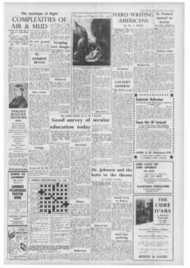Page 5, 15th May 1959
Page 5

Report an error
Noticed an error on this page?If you've noticed an error in this article please click here to report it.
Tags
Share
Related articles
See How It Runs From Name To Name And Strength To Strength
Cell Which Still Grows
Basset's Movement Through Cells And Sodalities
All Sorts
Listen To Tiiis
Fr. BASSET OF THE CELL
I 6E nthusiasm'
20th CENTURY SLANT TO A 400-YEAR-OLD TRADITION
S.J.
By DOUGLAS HYDE IN St. Patrick's Cathedral, N e w York, last Sunday, Fr. Bernard Basset, S.J., preached the World Sodality Day sermon. In it this well-known British Jesuit and
CATHOLIC HER ALD
columnist was able to tell something of the story of the unique sodality cells' movement which has been built up in this country under his guidance in recent years.
affairs, letters to the press and through campaigns like the Christmas Poster Campaign for which they are perhaps most famous.
Recent activities have included a Holy Week Poster Campaign, and a movement to get thousands of • cribs into department stores all over the country. The Lourdes Centenary Festiva!, was one of the sodality cells' most successful attempts to bring Christianity before the public. Fr. Basset and his "socialists" were determined to make Lourdes " news-" His aim has been to assist our Catholic schools to send out a steady stream of wide-awake young Catholics who are trained and willing to lead. Here is a tribute to their success which have received from Monsignor
Fr. Bernard Basset, S.J., well known CATHOLIC HERALD columnist for many years is at present contributing his "All Sorts" from the United States See p. 6 each week
ment of which he is the direcMorgan Sweeney, Secretary of for you must have some underthe Catholic Headmasters' Constanding of Fr. Basset himference : self. for his very considerable. " One problem of the schools imhas been to supply that seal for personality is indelibly posed on everything he the faith that is so necessary for has had to change the world about him. Father Basset has provided just that in his Leadership Courses."
* *
THOSE who have passed through these school courses are almost a recognisable type. And it is they. perhaps more than any others, who, finding their natural "home" with the sodality cells ensure that, like Fr. Basset himself, the sodality cells movement remains forever apostolic and never becomes old and stuffy in its outlook.
* *
BORN just half a century ago, there is still much of the big, overgrown schoolboy about him. His face remains perennially young and So do his mannerisms. Far more important, his zest for life, his enormous interest in people, his enthusiasm for the work he is doing all have a youthful quality about them. And he has a happy knack of being able to awaken this in others.
These are characteristics of the sociality cells, too. Sodalities, which are to be found all over the world, are the oldest form of the lay apostolate in the Church. They have been in existence for 400 years. Into an increasing number of the British sodalities Fr. Basset is injecting
something new which is young,
virile and very much of this
20th century.
* *
SOME 10 years ago Fr. Basset found himself in charge of a number of groups composed, in the main, of laymen who had belonged to the Sword of the Spirit cells which had been organised inside the R.A.F. during World War H. He welded them together into the Catholic Action Celts Movement.
Fr. Basset and his followers had been immensely impressed with the impact which a small group of Communists can make upon a big community. He believed that both the form of organisation and the zeal of the individuals who compose it contribute to its effectiveness. And so his "cells" set to work to leaven the lump.
Four years ago, shortly after Pope Pius XII had underlined the importance of the old sodalities as organisations for the lay apostolate, Fr. Basset was made national director. Soon the cells had been merged into many of the existing sodalities, bringing into the older movement a new militancy and a rather broader approach to their role and purpose.
Such sodality cells have been established in schools, colleges and universities, in residential areas and wherever a group of keen Catholics can be got together. One of the best organised of the universities is Oxford, where cells have been established in eight colleges.
• * *
WHEREVER they exist they work for the spiritual formation of their members, and campaign to make Christian opinion vocal. This is done by means of participation in public touches. a boy to use all the training he To understand the move.
blog comments powered by Disqus









